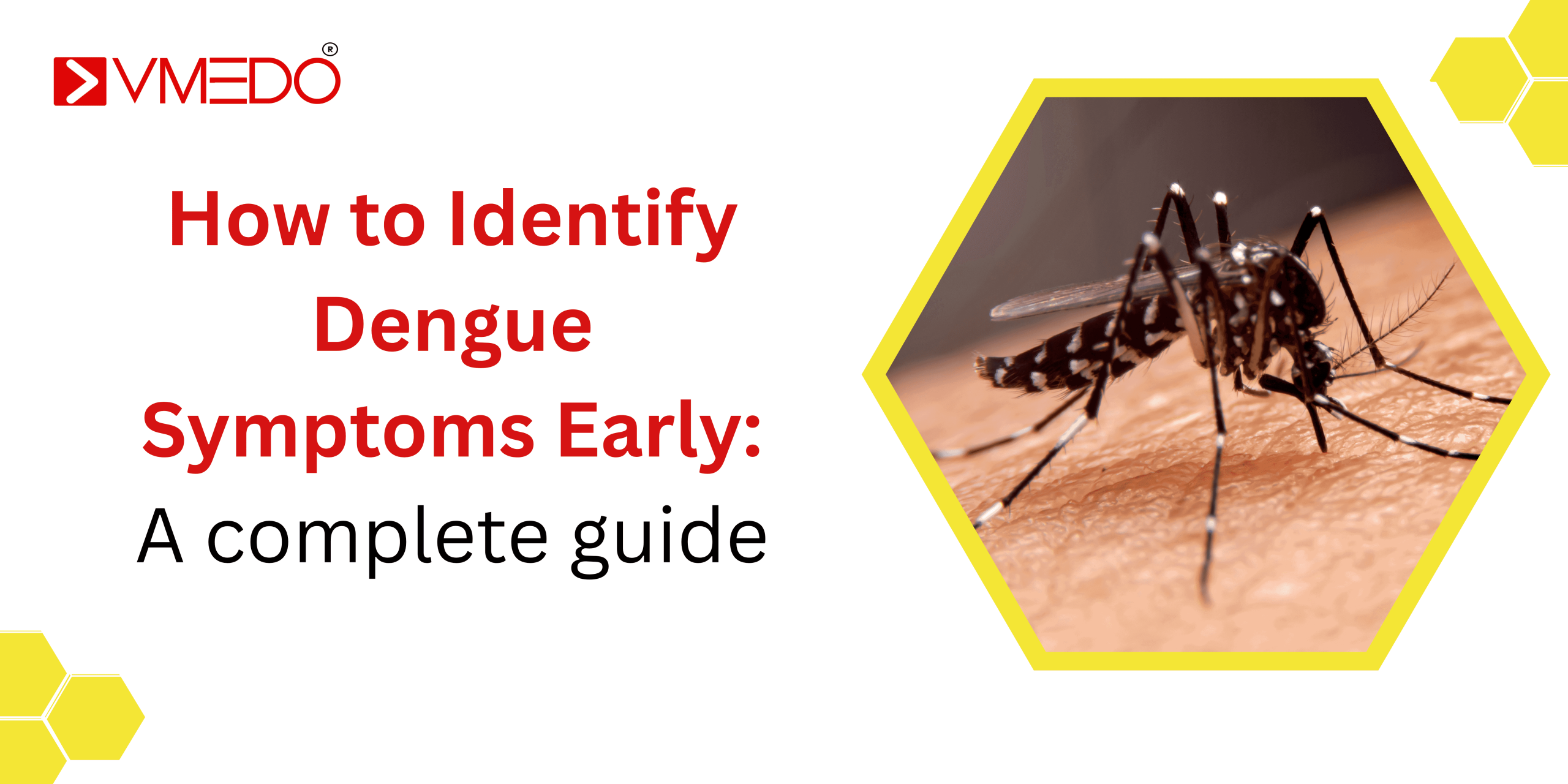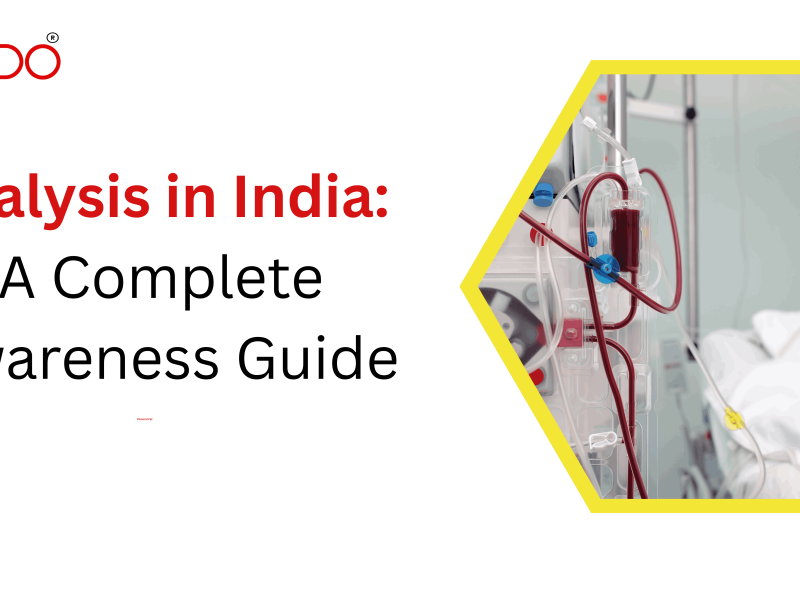Dengue fever is one of the fastest-spreading mosquito-borne viral infections in the world, affecting millions every year. In India alone, dengue cases rise significantly during the monsoon and post-monsoon seasons, making awareness and early symptom identification absolutely critical. While dengue is treatable, the real danger lies in delayed diagnosis, which can lead to complications like Dengue Hemorrhagic Fever (DHF) or Dengue Shock Syndrome (DSS).
In this complete guide, you’ll learn how to identify dengue symptoms early, how the disease progresses, when to seek medical help, and how you can protect yourself and your family. This blog is designed to be your go-to reference for understanding dengue—clear, actionable, and expert-backed.
What Is Dengue Fever?
Dengue is a viral infection caused by four related viruses: DENV-1, DENV-2, DENV-3, and DENV-4. It spreads to humans through the bite of an infected Aedes aegypti or Aedes albopictus mosquito—species that are most active during early morning and late afternoon.
Once a mosquito bites an infected person, it becomes a carrier and can transmit the virus for the rest of its life.
Dengue symptoms usually begin 4–10 days after the mosquito bite.
Why Early Identification of Dengue Symptoms Matters
Early detection can save lives. Many people confuse early dengue symptoms with flu, viral fever, or seasonal infections. Misdiagnosis or self-medication delays proper treatment, which increases the risk of complications.
Recognizing early warning signs helps:
-
Get timely blood tests (NS1 antigen, IgM, IgG)
-
Start medical care early
-
Prevent severe dengue
-
Reduce hospitalization duration
-
Improve recovery rate
Stages of Dengue and Their Symptoms
Dengue typically progresses through three stages. Understanding each stage helps you identify the disease early.
Febrile Stage (Day 1–3) – Early Symptoms You Must Notice
The febrile stage is the beginning of dengue, often mistaken for common viral fever. The symptoms start suddenly and may include:
Early Symptoms of Dengue
1. High Fever (104°F or above)
A sudden rise in temperature is one of the earliest indicators of dengue. Unlike normal fever, dengue fever is usually persistent and intense.
2. Severe Headache
A sharp, throbbing headache—often centered behind the eyes—is a classic dengue symptom.
3. Pain Behind the Eyes (Retro-orbital Pain)
If eye movement worsens the pain, it’s a strong sign of dengue infection.
4. Extreme Body Pain (“Breakbone Fever”)
Dengue is often called breakbone fever because of the severe muscle, bone, and joint pain.
5. Nausea and Vomiting
Frequent vomiting or a feeling of nausea is very common in the initial stage.
6. Skin Rash or Mild Red Patches
In early dengue, a faint rash may appear on the face, neck, or chest.
7. Fatigue and Weakness
Even after mild activity, the person may feel exhausted.
8. Mild Bleeding (in rare cases)
-
bleeding gums
-
nosebleeds
-
easy bruising
Why people ignore these symptoms:
These symptoms resemble viral flu or seasonal fever, leading to delayed testing.
Critical Stage (Day 3–6) – Warning Signs of Severe Dengue
When the fever drops, many people think they are recovering. But this drop in fever is the most dangerous phase. The patient must be monitored closely.
The virus may cause plasma leakage, which can lead to shock if not treated.
Critical Warning Signs
If you observe any of these, seek emergency medical care:
1. Persistent Vomiting (3+ times a day)
A sign of dehydration and internal complications.
2. Severe Abdominal Pain
Typically around the stomach or liver area.
3. Bleeding Symptoms
-
bleeding gums
-
nosebleeds
-
blood in vomit (hematemesis)
-
black, tarry stools
-
heavy menstrual bleeding
4. Sudden Drop in Platelet Count
Platelets may drop significantly (below 1 lakh or even 50,000).
5. Difficulty Breathing or Rapid Breathing
Caused by fluid accumulation in the lungs.
6. Cold, Clammy Skin
An early sign of shock.
7. Restlessness or Irritability
8. Enlarged Liver
Why this stage is dangerous:
Patients often feel “better” because the fever disappears, but inside the body plasma leakage increases.
Recovery Stage (Day 6–10)
If the patient crosses the critical stage safely, recovery is fast.
Symptoms During Recovery
-
Improved appetite
-
Stabilizing platelet count
-
Return of energy
-
Gradual disappearance of rash
A second rash may appear during recovery, also known as the “white islands in a sea of red” rash.
How to Identify Dengue Symptoms Early: A Practical Checklist
Use this checklist to differentiate dengue from common fever:
Dengue Early Symptoms Checklist
Sudden high fever
Severe joint/muscle pain
Headache behind the eyes
Metallic taste in mouth
Loss of appetite
Mild bleeding gums
Red patches on skin
Feeling extremely tired
If three or more of these occur, a dengue test is recommended immediately.
Key Differences Between Dengue and Normal Viral Fever
| Feature | Dengue | Normal Fever |
|---|---|---|
| Fever Pattern | Sudden onset, very high | Gradual rise |
| Pain | Severe body & joint pain | Mild to moderate |
| Platelets | Drop significantly | No major change |
| Rash | Common | Rare |
| Bleeding | Possible | Rare |
| Eye Pain | Very common | Uncommon |
Who Is at Higher Risk of Severe Dengue?
Certain people have a higher chance of complications:
High-Risk Groups
-
Infants and children
-
Pregnant women
-
Elderly adults
-
People with diabetes
-
People with hypertension
-
Anyone with previous dengue infection
-
People with weakened immunity
When Should You Get a Dengue Test Done?
You should test for dengue if:
-
You have fever for more than 2 days
-
You have classic dengue symptoms
-
Platelet count starts dropping
-
You live in or visited a high-risk area
-
There is dengue outbreak in your locality
Common Dengue Tests
-
NS1 Antigen Test (Day 1–5) – Detects virus early
-
IgM Antibody Test (Day 4 onwards)
-
CBC (Complete Blood Count) – For platelet levels
How Dengue Is Treated (What Doctors Usually Recommend)
There is no specific antiviral treatment for dengue. Treatment focuses on:
1. Hydration
Oral rehydration solution (ORS), coconut water, fluids, soups.
2. Fever Control
Only paracetamol is recommended.
Avoid: Ibuprofen, aspirin, diclofenac (they increase bleeding risk).
3. Monitoring Platelets
Daily CBC until recovery.
4. Hospitalization (If needed)
When complications appear.
Home Care Tips for Dengue Patients
Stay hydrated (very important)
Take only doctor-prescribed medicines
Avoid oily, spicy, or heavy food
Give the body complete rest
Monitor fever and platelet count daily
Drink fluids like:
-
coconut water
-
ORS
-
papaya leaf extract (optional, supportive)
-
vegetable soups
-
fresh juices
Foods to avoid
- Caffeinated drinks
- Ibuprofen or aspirin
- Fried food
- Alcohol
Frequently asked question (FAQs) on Identifying Dengue Symptoms
1. Can dengue start without fever?
- Rare, but possible in mild cases.
2. When does dengue become dangerous?
- Between Day 3 and Day 6, during the critical stage.
3. Does dengue spread from person to person?
- No. It spreads only through mosquito bites.
4. Can dengue happen again?
- Yes. There are 4 strains, and infection with one does not protect you from the others.



